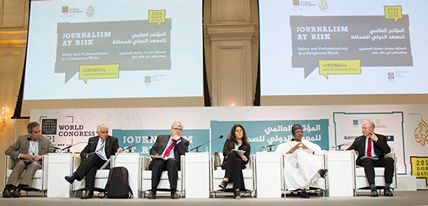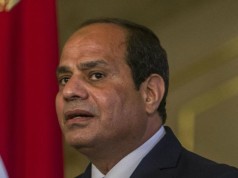
International Press Institute (IPI) members attend the 65th IPI General Assembly during the IPI World Congress in Doha Qatar. Photo: Al Jazeera Media Network Countries across the Middle East must do more to respect press freedom and free expression in both law and practice, leading international journalists gathered in Qatar for the International Press Institute (IPI)’s World Congress said today. IPI members, meeting at their 65th Annual General Assembly in Doha, unanimously adopted four resolutions urging governments in the region to free journalists and others imprisoned for exercising those rights, and to uphold their commitments to respect all fundamental human rights. In the first resolution, IPI members called on member states of the Gulf Cooperation Council (GCC) to end abuses of public order and state security laws to punish critical journalism. They also called on the GCC, which includes Qatar, to abolish criminal defamation and blasphemy laws, as well as similar provisions granting special protection to reputations of the state or heads of state, and to respect peoples’ right to share and access information online. The resolution noted that at least five journalists or bloggers are currently being held in Bahrain and seven are being held in Saudi Arabia, including the blogger Raif Badawi, who faces a sentence of 10 years in prison, 1,000 lashes and a fine for allegedly “insulting Islam through electronic channels”. A second resolution urged Iran to free dozens of bloggers and journalists currently behind bars and to capitalise on recent political developments to move to ensure that journalists are allowed to cover news in the public interest without fear of violence or arbitrary detention. In the third resolution, IPI members called on Turkey to end an escalating crackdown on independent media and dissenting voices that has seen the misuse of anti-terrorism laws to target and imprison journalists reporting on public interest issues, as well as the abuse of criminal defamation laws to silence any criticism of President Recep Tayyip Erdoğan and his policies. The fourth resolution similarly urged Egypt to free imprisoned journalists, many of whom have been mistreated, and to uphold free expression provisions enshrined in the country’s 2014 Constitution, which was approved by 98 percent of those voting on its adoption. IPI members also stressed the need to end abuse of overly broad anti-terrorism laws and reform the country’s judiciary to ensure independence. IPI members today also unanimously approved a fifth resolution calling on member states of the Organization for Security and Co-operation in Europe (OSCE) to fully support the Office of the OSCE Representative on Freedom of the Media. The current Representative, Dunja Mijatović, was recently reappointed to a one-year term amid rumours of political wrangling over who was to be named her successor following the conclusion of her previous term on March 10. That decision, which requires unanimous approval by all 57 participating OSCE member states, has now been put off until 2017. The full text of each of the five resolutions appears below. In other news, IPI members today elected five new members to IPI’s Executive Board, which holds supervisory authority over IPI. The new members include Beata Balogová, editor-in-chief of the Slovak daily newspaper SME; Woosuk Kenneth Choi, deputy editor of the daily Chosun Ilbo in South Korea; Kadri Gürsel, journalist and political columnist for the Al-Monitor and Diken news websites and chair of IPI’s Turkey National Committee; Joe Muganda, group CEO of the Nation Media Group in Kenya; and Virginia Pérez Alonso, deputy editor-in-chief of the Spanish newspaper El Mundo. Pursuant to constitutional changes that IPI members also approved today, the new IPI Executive Board members were elected to three-year terms, with a limit of no more than two consecutive terms. Former Executive Board members who served two terms may stand for election to rejoin the Board after having been out of office for three years.




